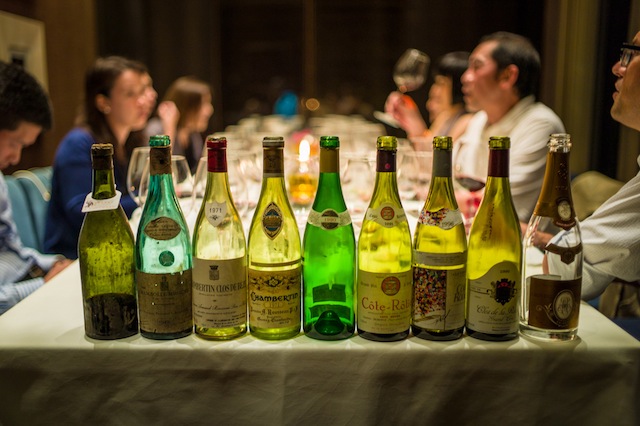 By Tammy Allman
By Tammy Allman
“Never mix business with pleasure,” they say. But that’s exactly what married couple Mandy Chan and Jason Ginsberg decided to do when they moved from Canada to Hong Kong in 2009 with their two young children to establish their own fine vintage wine business.
It was the biggest gamble of their lives. Having no experience of the wine industry or first-hand knowledge of the Chinese market for wine, Chan and Ginsberg gave up their successful careers and sold their Toronto property to fund the purchase of their initial portfolio.
Four years later they have established themselves as a highly successful online merchant in Hong Kong’s lucrative fine wine market, which is now the world’s largest, surpassing even London and New York.
Selling wines was a friend’s suggestion. Hong Kong had just abolished duties on wine to encourage trade and China was wine-thirsty. “As we began to consider it seriously, we quickly saw the huge business potential,” said Chan. And Hong Kong wasn’t entirely foreign to them: Chan’s parents were living in Hong Kong and Chan also lived in Hong Kong as a child. Relocating here seemed a natural choice.
Ginsberg admits they were complete novices: “We knew nothing about the wine business,” he said. “The only thing we knew about wine was that we liked to drink it!” They enrolled in formal wine schooling and for the next year they worked on a business plan.
“We knew we should be looking at the higher end of the wine market”…because Hong Kong loves luxury,” said Chan. Ginsberg added, “The operational costs of running a business in Hong Kong are so much higher than in the rest of the world.” Basics like office space and housing were much more expensive as was the state-of-the-art storage facility the couple purchased to ensure that the wine would not spoil while in transit to a steamy Hong Kong.
The secondary rare and fine wine market is completely different from the traditional wine retail business, Ginsberg explained: “It’s more like trading commodities because of the way the prices fluctuate.” They felt this played to their combined experience: Ginsberg in trading, as a former real estate professional, and Chan’s computer programming skills as a former software engineer. “Its also relatively low barrier to entry,” said Chan. “If you have this type of stock and you price it and market it well, you’ll most likely do well.”
Due to the financial crisis they were buying at a particularly good time. “There were people who needed money and they had too much wine,” said Ginsberg. “We were lucky enough to pick up a really, really good collection. The best wines you could possibly want to learn from.” They also invested heavily in Burgundy and in bio-dynamic wines. “We had no idea what to do and we bought way too much of the bio-dynamic wines,” he said.
In the first few months of Ginsberg+Chan, they operated from their apartment while they worked on marketing and building their brand. “Our strategy was to just be the best price in town. And at that point we could do that because we had bought so well,” Ginsberg said.
“It was the frothiest wine market that there’s ever been,” he said. “The appetite for first growth Bordeaux was unbelievable,” referring to the group of First Growths of Bordeaux – Chateau Mouton, Margaux, Lafite, Latour, Haut Brion — widely regarded as the blue-chip investment grade wines. “We would buy wine from the US and by the time it had arrived two-weeks later, it was sold and had appreciated in value by five percent,” he said.
According to Ginsberg, it was a steep learning curve. Due to inexperience they didn’t spot the peak of the market soon enough; “I bought a lot at the top of the market and when the market started to decline, I didn’t sell fast enough,” he said. “We went from complete highs to complete lows. And that was really scary.” However, a diverse portfolio of trading and investment stock and a strong returning private client business kept their profits healthy, even though prices were declining.
From trading out of their apartment, they now have a team of five and are based in a trendy loft-style office space, complete with tasting area and on-site storage for a small number of wines. Ginsberg said they have outgrown their current office-space in less than two years. “We’re growing in multiples,” said Chan. Their main storage facility lies 20 km away, a state of the art, temperature-controlled warehouse that houses around 10,000 bottles.
They specialise in purchasing older and rare fine wines from private collectors and respected traders and they mostly cater for private clients and professionals in the wine trade.
“We are first and foremost stock holders,” said Chan. “We aim to combine the old world of wine mercantilism with the new world of online marketing.” They want to create a real sense of the shop’s identity and their personalities for their online purchasers. They say the look and feel of their website is more human and their service more personalised than other fine wine merchants in Hong Kong. If you call them it’s likely one of them will answer the phone, and all their gifts are hand-tied and their merchandise hand-delivered. “We interact with our clients as much as we can,” said Chan.
Client dinners and tastings are “basically just fun gatherings to meet our customers and open up some good wines together,” says Ginsberg. “The hardest thing is getting people to leave when the tasting is over,” he said. “They all want to stay and drink!”
Ultimately, it’s the quality of the inventory that they say draws people in. “We’ve always wanted to have this list that when people look at it they ogle,” Chan said. But to understand how good that list is requires an educated eye and palate. “The way we’ve structured our portfolio and the presentation of our company is that it’s more geared towards people who are already wine connoisseurs”…We’re really aiming at the wine geeks.”
They now have a solid brand in an industry in which reputation is everything. “We only work with well-known dealers who have been in the market for years and years,” said Ginsberg. Authenticity is a key issue: “Everyone is really cautious,” he said. “Fakes do slip through the cracks and we’ve seen some,” so they make it a priority to examine all bottles when they arrive to their warehouse before they are put up for sale.
Ginsberg+Chan remains inventory-focussed but is seeking to broaden the business. “Hong Kong is still considered a young market,” said Chan. Pointing to more mature markets such as England where merchants successfully combine wine investment with wine services, they said they are currently working on plans to offer private cellars; for a minimum of HK$120,000 paid in monthly instalments over two-years, clients will work with an advisor to create their own cellar.
And so far their big gamble has paid off. “The fact we are working together, we still love each other and we get to hang out together,” said Ginsberg. “It’s been hands-down five times more successful than we ever hoped it would be. On every level.”
 About the Writer
About the Writer
Tammy Allman obtained a degree in English Literature and worked as a high net wealth tax adviser for 14+ years. Following a move to Asia she is now studying for a masters degree in journalism. She has lived in Hong Kong for the past four years with her partner, Jonny, and their little girl, Maggie. Some of her main interests include literature, travel and the study and practice of yoga. She is a supporter and volunteer for the Cambodian Children’s Fund, a Cambodian-based charity. Follow Tammy on Twitter @TammyAllman1





